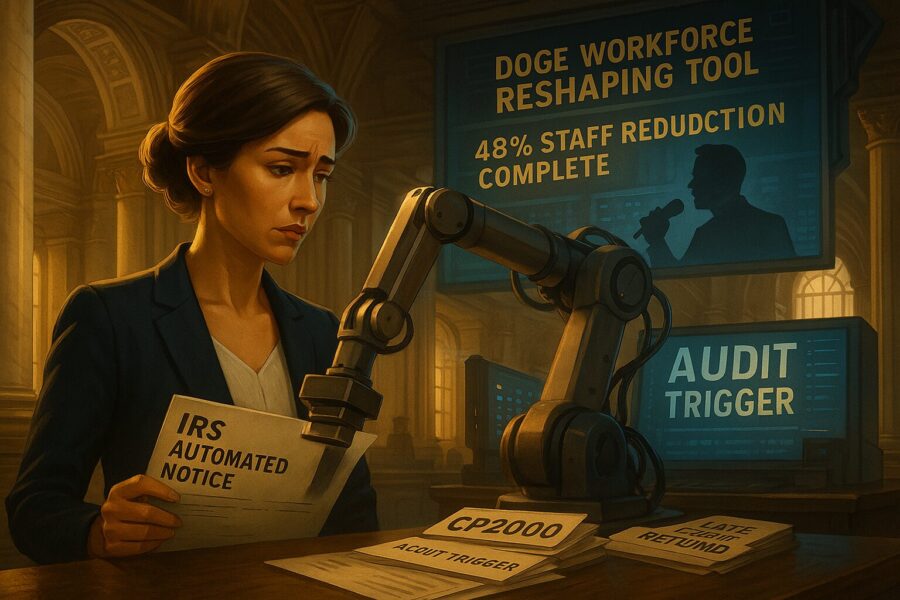There’s a quiet storm brewing in Washington. And no, it’s not another round of debt ceiling drama. This time, it’s about jobs. More specifically, the IRS imay be cutting more of their workforce. We’re talking federal jobs. A lot of them.
By the way, if you didnt; read my previous article about this very subject – you can find it >> HERE <<.
Under the radar, Elon Musk’s federal agency. YES, you read that right, the Department of Government Efficiency (DOGE) has helped build a new software tool that makes it easier (and much faster) for U.S. agencies to lay off employees en masse.
Think of it like ChatGPT for pink slips. Imagine that, the government using ChatGPT (or something similar)?
Now before you dismiss this as just another D.C. tech update, consider this: over 260,000 federal workers have already taken buyouts, early retirement, or been laid off since January.
And with the IRS planning to cut nearly 40% of its workforce. We’re not just talking about internal HR changes. We’re looking at a potential shake-up of how your taxes are processed, audited, and enforced.
Let’s break it down.
The “Workforce Reshaping Tool” – A Softer Name for a Faster Guillotine
The software, a revamped version of a dusty old Pentagon program called AutoRIF (Reduction in Force), is now being rolled out to agencies across the federal government. It automates what used to be a slow, spreadsheet-heavy process. Ranking employees for termination based on factors like seniority, veteran status, and performance.
Under DOGE’s direction, the new version is faster, web-based, and comes with a far more friendly name: The Workforce Reshaping Tool (because “AutoRIF” just screamed “pink slip”).
And the timing? Perfectly aligned with mass layoff plans already brewing inside large agencies like the Department of Veterans Affairs. This initiative (if that’s what you want to call it) is looking to cut 80,000 jobs. And the IRS, which, according to media reports, wants to slash nearly half its workforce. You read that right, that’s 50% of the people that work for the IRS.
I can tell you, from personal experience… a LOT of tax preparers are worried about this latest development.
How This Could Hit You: 3 Tax Fallout Scenarios You Shouldn’t Ignore
Most people will read this headline and shrug. But if you’re a business owner, tax pro, or just someone trying to stay ahead of the curve, here are three real-world ways this “software update” could land on your desk:
1. Delayed Refunds, Processing Backlogs, and More DIY from the IRS
The IRS is already notorious for moving slowly. Now imagine them with 40% fewer hands on deck.
Expect longer refund wait times, delayed response to letters, and a heavier reliance on AI to review returns. That means more automated notices, less human judgment, and possibly more inaccurate audits.
Strategic takeaway: This is the year to document everything and avoid gray areas on your return. If a bot reviews your deductions, nuance won’t save you — clean records will.
2. Audit Focus Could Shift (and Not in Your Favor)
Fewer IRS employees doesn’t mean less enforcement. It likely means more targeted enforcement.
With fewer agents, the IRS may lean harder on automated flagging tools, zeroing in on areas they’ve historically struggled with:
- S-Corp compensation
- ERC (Employee Retention Credit) abuse
- REPS – Real estate professional status
- High-income filers with flow-through entities
Strategic takeaway: Audit defense starts with good planning. If you haven’t had your return reviewed by someone who understands how the IRS thinks, now is the time. Don’t wait for a CP2000 to show up in your mailbox.
3. Fewer People, More Mistakes (and the Burden’s on You)
When agencies cut too fast, accuracy suffers. According to Reuters, some federal employees were fired by mistake and had to be rehired. If that’s what’s happening internally, you can bet tax return processing, or penalty assessments, won’t be immune to sloppiness.
Strategic takeaway: If you get an IRS notice, don’t assume it’s correct. Mistakes are going to spike. Respond swiftly, and document your position clearly.
Final Thoughts: “Efficiency” Can Be a Double-Edged Sword
There’s no question the federal government has room to streamline. But rapid downsizing (especially at agencies like the IRS) can create unintended ripple effects that land squarely on the shoulders of taxpayers and business owners.
Elon Musk may be stepping back from DOGE, but the systems his team helped revamp are just getting started. This isn’t just a government software update. It’s a full-on infrastructure shift that could change how your taxes are handled for years to come.
If you haven’t reviewed your tax strategy for 2025 yet, this is your warning shot. Let’s take a look at where you might be exposed and how to future-proof your position before the bots take over.
If you’re as worried as me, there is no better time to review this than NOW!. Book a free consultation right now.
Welcome to the New Age of Accounting. Let’s begin.

Chris is the Managing Partner at Weston Tax Associates, a best-selling author, and a renowned tax strategist. With over 20 years of expertise in tax and corporate finance, he simplifies complex tax concepts into actionable strategies that drive business growth. Originally from Sweden, he now lives in Florida with his wife and two sons.










